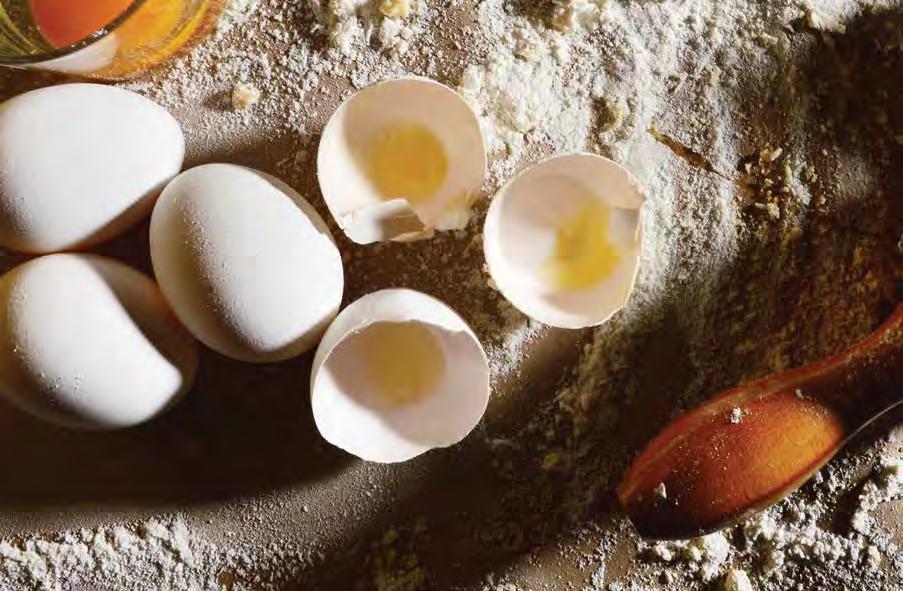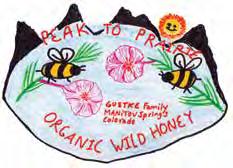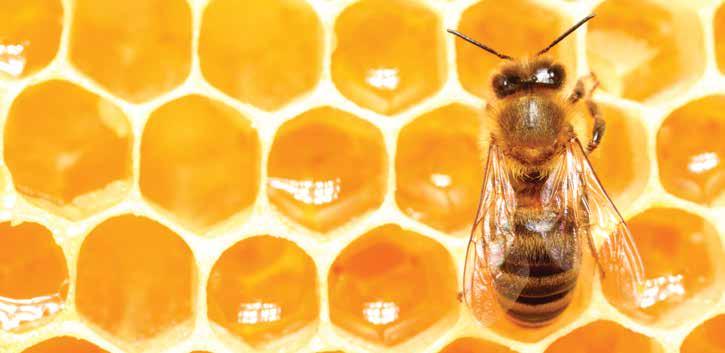
5 minute read
Bread and Bees
BREAD AND BEES: Buzzing Through Life at the Gustke Household

by Abigail Gustke ’16, daughter of Science Faculty Rob Gustke P ’16, ’18
n recent summers, the square green space of our backyard courtyard has come alive with the sounds and sights of sunshine, birds, bees and fluttering butterfly wings. As the flowers begin to bloom, shades of yellows from the black-eyed Susans and purples from the lavender explode from the beds. While the flowers stretch their limbs and spread their perfumes, many other life forms are awaking. A fat orange cat soaks in the sunshine, birds splash in the bath, and my dad sneaks around with his camera, patiently waiting for the perfect shot at a Junonia coenia as it I

nectars from the butterfly bush. Interacting and observing nature has always been an immensely important part of our family life. It has been a running joke in our family that my father’s passions lay in the category of words starting with “B”: bees, bread, butterflies, beer, books, bikes and BIG mountains. As I have witnessed my father reveal and explore his passions, I have come to learn and appreciate the profound connections he has made with nature through observing with his eyes and creating with his hands.

I would not call my father a transcendentalist nor a modernist, but a naturalist—one who looks to love, appreciate, create and understand a vast part of the world around him. Through his exploration of beekeeping and bread making, I have watched my father connect with the world around him—taking time away from the ramble and hustle of human life—to unite with aspects of what truly makes life worth living.

Beekeeping in itself is a difficult art to learn, master and appreciate. While honeybees appear seemingly calm and passive, in reality they are protective, motivated and relentless workers who strive for perfection. They want no one and nothing to interrupt their process. So naturally, my father decided that he wanted to conquer the challenge of coexisting and working with these fuzzy-bellied insects.

After numerous calls to his longtime friend and fellow beekeeper, Tony, and a trip to the bookstore for “Beekeeping for Dummies,” my dad ordered hives and placed them on the back prairie of Fountain Valley School. We then drove up to Boulder to claim his new partners in honey production: a wild swarm of bees that had invaded the barn eaves on Tony’s farm.
The next couple of years were a whirl of bee stings, reading, cooking sugar-water solutions, flower planting and overall experimentation on how to properly keep bees happy and producing honey. And yes, it also included incidents such as escaping angry bees by rolling down a hill into a stream. Finally, after many trials and toils, my father harvested his first batch of allnatural, Colorado-raised honey, straight from the hayfields of Fountain Valley. We spent a couple days making labels, cutting honeycomb and finally driving up to Boulder to spin the honey out from the combs. Witnessing the golden river of honey leaching from the spinner into jars—with labels that were crafted by the young hands of my sister and I—revealed a complete process of natural pollen and nectar being turned into a sweet stream of months of hard work on both the bees’ and my father’s part. He had achieved joining with insects and plants to create liquid gold that dazzled. Honey! A dual effort by Gustke and the bees

Similar to the manner in which my father worked the bees—passionately investing in a painstaking but rewarding process— he also applies to making bread. He fills the air of our kitchen and the FVS dorm common rooms with aromas that call to
Gustke’s braided poppy seed bread


hungry stomachs just as flowers beckon to honeybees. Various Christmas stollens (a traditional German sweet bread), pumpkin rolls, white breads, sourdoughs, zucchini breads and banana breads are made year-round and are often accompanied by honey created by the very same hands. These breads have filled bread baskets at family gatherings, are given as gifts, and have been the makings of many school lunch sandwiches over the years. My father’s bread will always hold a special place for the girls he has coached on the Fountain Valley swim team. At a 6 a.m. practice, he is known to bring a big pan of his warm cinnamon rolls. And after every meet, he honors a swimmer with the Breadwinner Award, given to an athlete who has shown real grit in competing. Making bread is an act of serenity for my father. I see him relax and enjoy what is not only a hobby, but a way to make himself and others around him happy. It allows him to express his love of the pure action of creating and being passionate about an activity.
Whether it is making bread, working with bees, teaching, taking butterfly photographs or camping with his family, my father lives his life with passion and a true dedication to understanding both the human and natural world around him. From him, I have learned that it is important to love, learn and be passionate about whatever I do, and that by observing processes in nature, I can connect more deeply with this thing called life.










